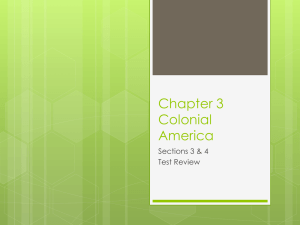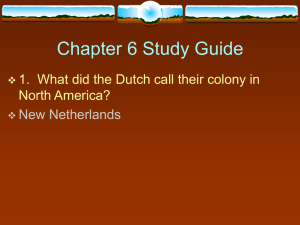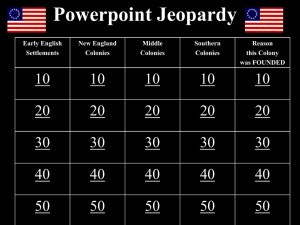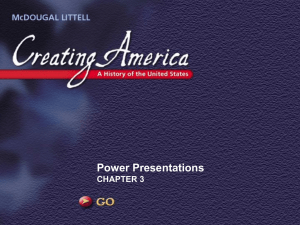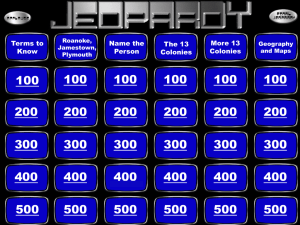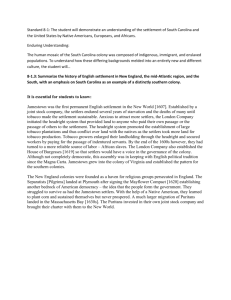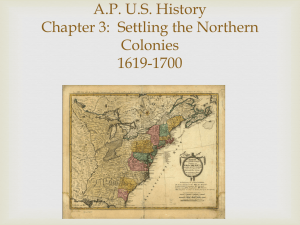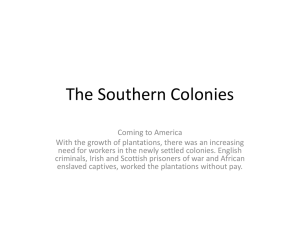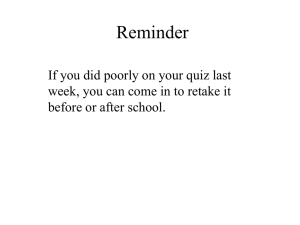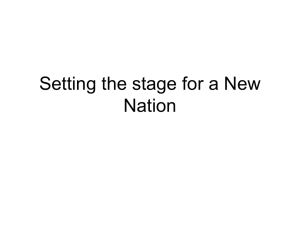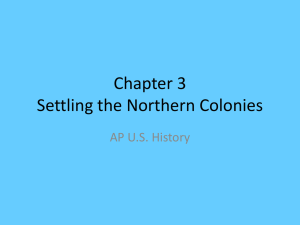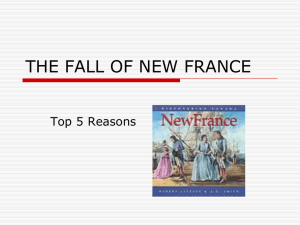Sect. 1 – Early Colonies Have Mixed Success
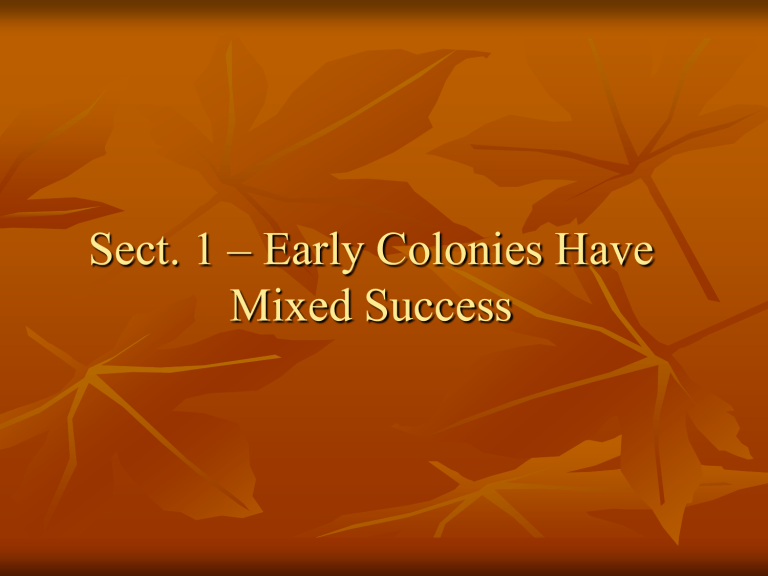
Sect. 1 – Early Colonies Have
Mixed Success
The English Plan Colonies
Colonies would provide a market for English exports
Source or raw material
Increase trade
Build up gold supply
Mercantilism – state controls trade and attempts to transfer wealth from colonies to parent country
Reasons for going to America
Lack of economic opportunity in England
Gold mines
Religious persecution
Financing a Colony
Joint-Stock Company
Backed by investors – people put money in to earn profits
Investor got shares
Split any profits
Divided any losses
Virginia Company of London, Virginia Company of
Plymouth, (later Massachusetts Bay Company and Dutch West
Indies Company)
Charter
Written contract
Issued by government
Gave the holder right to establish colony
Who – Who were among the settlers at
Sagadahoc?
Convicts
Who was their leader?
George Popham
What happened to the colonists at Roanoke?
Cut off from food supply by Native Americans – sent back to England
What happened to the colony at Sagadahoc?
Arguments, harsh winter, fights with Native Americans, food shortages, forced to return to England
What was the House of Burgesses?
Elected representatives that would meet once a year
– first representative assembly in American
Colonies
What was Bacon’s Rebellion?
Marched into Jamestown, took control of House of
Burgesses and burned Jamestown to the ground.
When was Jamestown settled?
1607
When did the starving time end?
Starving time ended in 1610
Why did the settlers go to Jamestown?
Make money, find gold, new life, greater opportunities
Why didn’t the settlers get along with their neighbors?
Because they wanted more and more of their land
Why did Jamestown nearly fail?
Disease, unwilling to work, more interested in gold than work
Why did Bacon’s rebellion occur?
Opposed William Berkeley
High taxes
Favoritism toward large plantation owners
Bacon wanted war with Native Americans to seize land for tobacco
Where was Roanoke?
Island off of North Carolina
Where was Sagadahoc?
Maine – mouth of Kennebec River
Where was Jamestown?
In Virginia, on a small peninsula on James River
How was Jamestown saved from failure?
John Smith took over and forced colonists to work – tobacco provided money to build the colony.
Sect. 2 – New England Colonies
King James vs.
Pilgrims
Puritans vs.
Church of
England
Causes of
Conflict
Result of Conflict
Pilgrims a separatist group.
King attacked them for rejecting
England’s Official church.
Fled to Holland first. Approached
Virginia Comp. To arrange to settle in
America
Religious beliefs
Wanted church of
England to
“purify” its practices
Bad treatment by
King. Left England to form colonies in
America .Great
Migration
Causes of
Conflict
Result of
Conflict
Puritan leaders vs. Roger
Williams
Opposed forced attendance at church. Opposed taking Native lands by force
Left and started
Rhode Island
Puritan leaders vs. Anne
Hutchinson
Believed person could worship
God without help of church, minister or Bible
Banished and fled to Rhode Island
Quakers vs.
Massachusetts
Commonwealth
Causes of
Conflict
Result of Conflict
Believed that each person could know God directly through an inner light – no minister or bible needed.
Treat Native
Americans fairly
Called Quakers.
Whipped, imprisoned or hung. .Left for
Rhode Island
King Philip’s
War
Causes of
Conflict
Result of
Conflict
Americans – land belonged to person or group.
Native Americans
– land belonged to everyone.
Religion.
Increased population of
Europeans
Colonial victory.
Destruction of 12 colonial villages-
600 military -
3000 Native
Americans killed.
King Philip killed500 Native
Americans enslaved
Salem
Witchcraft
Trials
Causes of
Conflict
Result of
Conflict
Younger Arrests, trials and generations – different religious view than that of execution for witchcraft.
parents. False accusations.
Witch hunts
What was the Mayflower Compact?
Vowed to obey laws agreed upon for the good of the colony
Helped establish the idea of selfgovernment and majority rule
PILGRIMS LAND
How did Squanto and Samoset help the
Pilgrims?
Interpreter between Pilgrims and Chief
Massasoit
Negotiated a peace treaty
Showed them how to plant, hunt and fish
Describe the First Thanksgiving.
Three day feast
Represented the peace that existed at the time between Native Americans and
Pilgrims
What was the New England Way?
Congregation – group of people who belonged to the same church
Set up own town
Meeting house
Most important building
Gathered for town meetings
A form of self government
Made laws and other decisions for the community
Only male church members could vote or hold office
By law all had to attend church services
Sermon provided instruction in New England
Way
Emphasized duty, godliness, hard work and honesty
Dancing and playing games would lead to laziness
God requires them to work long and hard at their vocation
Work ethic contributed to rapid growth and success of New England Colonies
Depended on Education – laws required that all children be able to read
Who founded Connecticut?
Thomas Hooker
What is the Fundamental Orders of
Connecticut?
A constitution
Extended voting rights to non-church members
Limited the power of the governor
Expanded the idea of representative government
Describe the Beginning of New
Hampshire?
Village near Portsmouth
John Wheelwright – town of Exeter
Exeter Compact – based on Mayflower
Compact
FOUNDING THE MIDDLE AND
SOUTHERN COLONIES
What attracted Catholics, Quakers and Jews to these colonies?
Religious freedom
What economic activities were important in the Middle Colonies?
Hudson and Delaware river supported shipping and commerce
River valleys had rich soil and mild winters
Conditions favorable for farming and raising livestock
What area did New Netherland include?
Included Hudson river Valley, Long Island, land along
Delaware river
Explain the Patroon system. How did help attract settlers to New Netherland?
Patroon system
Person brought 50 settlers
Reward – patron received large land grant
Special privileges in hunting, fishing and fur trading on land
Jews, Africans as slaves, indentured servants and Puritans
How did the English acquire New
Netherland?
Peter Stuyvesant – governor
Attacked New Sweden
New Sweden surrendered
Explain how the Duke of York became owners of New York?
King Charles II wanted Duke to drive Dutch out of Netherland
Dutch a threat to England’s trade
Threat because of expanding settlements and location
When Duke’s ships appeared off New
Amsterdam the colony surrendered
Became a proprietary colony of New York
Duke was owner
How did the province of New Jersey come about?
Duke of York gave province of New Jersey to George Carteret and Lord John Berkeley
How did the owners of the New Jersey colony attract settlers?
Promised freedom of religion
Large grants of land
Representative assembly
How did Wm. Penn receive the land called Pennsylvania?
Joined the Quakers
Attacked for his beliefs
King Charles gave him large piece of land in America in partial payment to his family
Called Pennsylvania – Means “Penns
Woods”
Created a colony for Quakers
How did Penn’s religious beliefs affect the way he governed Pennsylvania?
Quakers
All people should live in peace and harmony
Welcomed different religions and ethnic groups
Wanted Native Americans to be treated fairly
Policies made Pennsylvania one of the wealthiest of American Colonies
How did Delaware come about?
Granted three lower counties of Delaware their own Assembly – became Delaware
What attracted settlers to the Southern
Colonies?
Maryland, Carolinas and Georgia
Soil and climate suitable for crops such as tobacco, rice and indigo
Why did Lord Baltimore establish
Maryland?
For Roman Catholics fleeing persecution in
England
Promised religious freedom to attract more settlers
Passed Toleration Act
What was Maryland’s economy based on?
Economy based on tobacco
Used up the land
Had to clear new land every 3-4 years
Laborers came as servants or slaves
Few women as settlers
Who were the first settlers to Carolina and how did they live?
Early settlers build Charles Town –
Charleston
Cut timber, raised cattle and traded with
Native Americans
Refuge for Huguenots (French Protestants) seeking religious freedom
What changed the economy of
Carolina and how did this lead to the beginning of slavery?
Needed laborers to grow rice and indigo
Encouraged to used enslaved Africans
Sold Native Americans into slavery
Battle between settlers and Native
Americans over Indian slaves and taking of land
In what way did Carolina change after it became a royal colony?
Battle between settlers and Native
Americans over Indian slaves and taking of land
No help from owners so they overthrew the rule
Became Royal Colony – governor appointed by King
Divided into North and South Carolina
Why did James Oglethorpe found Georgia?
Refuge for debtors
How did the English government intent to use the
Georgia colony?
English governor wanted a military outpost against
Spanish Florida and French Louisiana
Spanish tried to force English out but unsuccessful
Who settled in Georgia?
English, German, Swiss and Scottish
All religions welcome
Why did Oglethorpe lose control and what happened to the colony?
Oglethorpe set strict rules that upset colonists
King made a royal colony
Visual Summary
Back to
Transparencies
